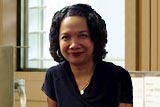Researcher awarded Marie Curie International Incoming Fellowship (IIF)
Dr. Pranee Inprakhon, lecturer of Mahidol University, Bangkok Thailand, has been awarded a Marie Curie International Incoming Fellowship (IIF) from the European Union FP7 to work on a project entitled “AquaCat –Tailors made lipases for synthetic catalysis in biphasic media: From poly(lactone) applications towards novel sugars esters” at Project Group BioCat, Fraunhofer Institute for Interfacial Engineering and Biotechnology IGB, Straubing. The project will focus on the development of innovative, greener process using renewable resources for synthesis of products of commercial interest.

Pranee brings her skills in enzymatic polymerization and works closely with an expert team of Prof. Volker Sieber, an eminent European researcher in the field of renewable resources utilization for two years starting from June 2012 to May 2014 followed by a one year return phase at her home country. Dr. Lars Wiemann, who is guiding the works in the laboratories of the BioCat group in Straubing, is really glad to work closely together with an experienced researcher in this thrilling field. The outcomes of this project will be extremely important to Europe, as sustainable chemistry is identified as a key driving force contributing to the achievement of the Lisbon strategy and EU strategy for 2020 to make Europe the most competitive and knowledge-based economy in the world. Green technology involving renewable resources utilization has been identified as one of the key topics requiring more research activity.
About International Incoming Fellowships (IIF)
Marie Curie Incoming International Fellowships are individual fellowships that aim to attract top-class researchers from third countries to work and undertake research training in Europe from 1 to 2 years (incoming phase), with a view to developing mutually-beneficial research co-operation. In the case of emerging and transition economies and developing countries, the scheme may assist fellows to return to their country of origin for, typically, half the duration of the first phase (re-integration phase). Proposals from all areas of scientific and technological research of interest to the European Community are accepted and there are no pre-defined priority areas. For more information, please visit
 Fraunhofer Institute for Interfacial Engineering and Biotechnology IGB
Fraunhofer Institute for Interfacial Engineering and Biotechnology IGB